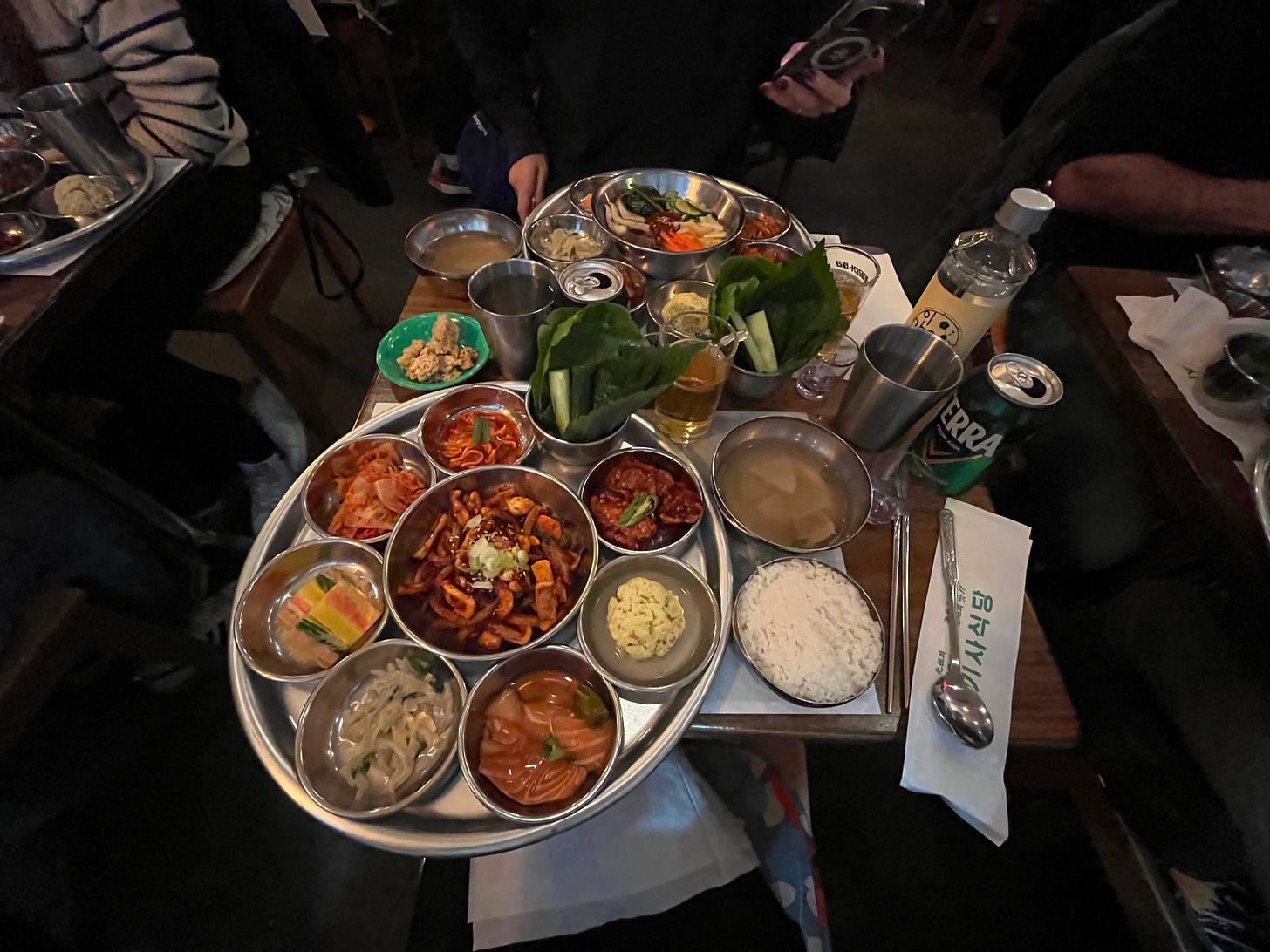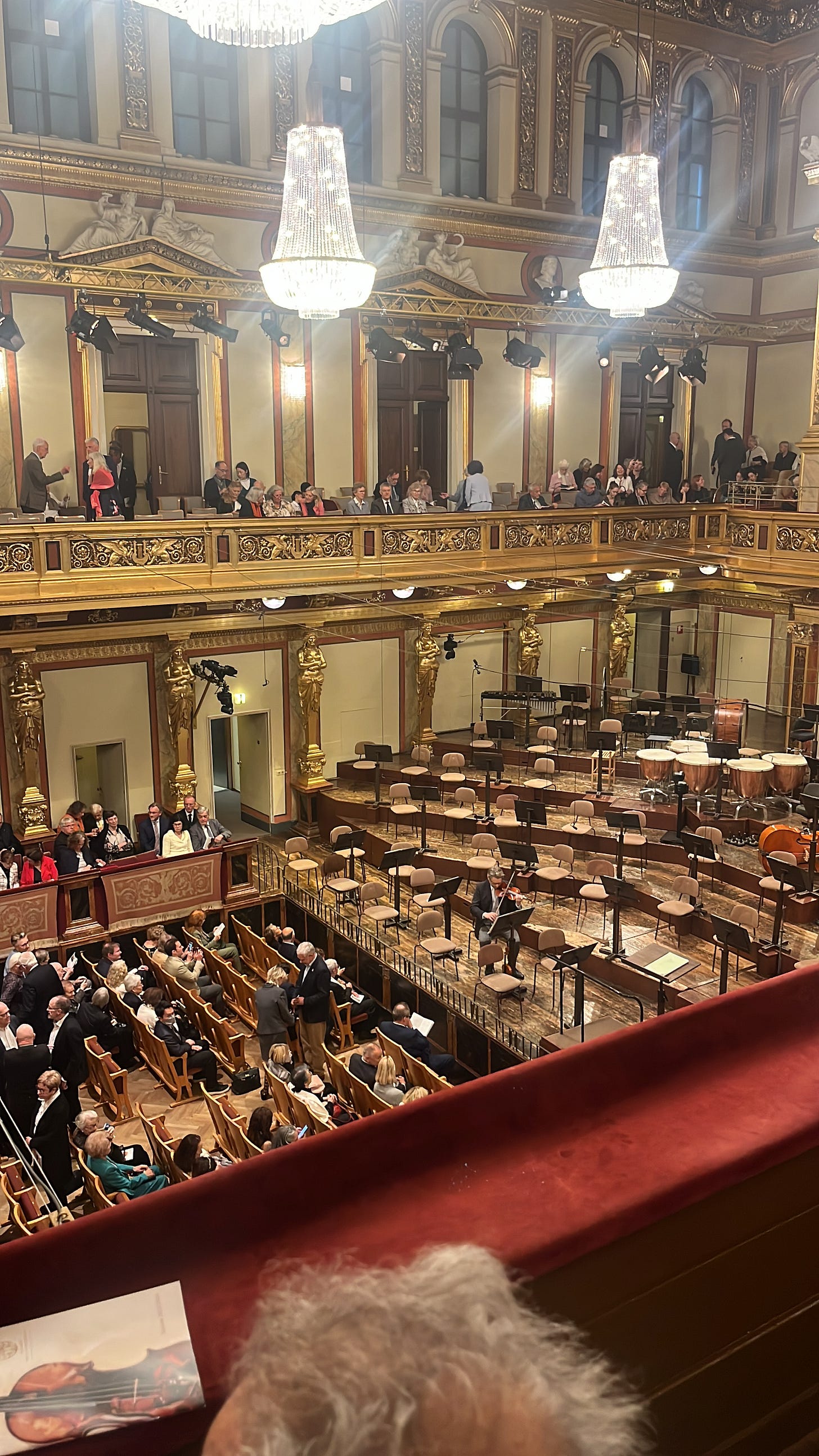November was a month bursting at the seams—a month of overdrive. A relentless search for the next best thing in the shadow of a massive letdown. After the election, I’ve buried myself in distractions, tempering anger and frustration with media that either directly addresses or tangentially explores my concerns. Weathering has been, and will continue to be, the name of the game.
In an effort to confront my helplessness, I found my way to a Quaker meeting hall—the most important thing I’ll carry forward from this month. One of the congregants, moved by the spirit, shared these words in the plain white worship space on 15th Street:
“Moses and the Israelites wandered for forty years between slavery and the Promised Land. But how do we—how do I—do lost well?”
The relevance of his question struck me to my core: doing lost well. Each of us must find our own methods of navigating loss, trusting that our individual commitments to honest searching will ripple into the collective consciousness.
I maintain my optimism, however deluded it may be, by imagining the next four years as a great purge—a vomiting up of all the debris that has accumulated beneath the surface of life, liberty, and the pursuit of happiness. I know what you’re thinking: that waste won’t simply vanish once it’s expelled. It will be displaced—onto things and people. And yet, I believe this putrid byproduct will become something unignorable, impossible to deport or dismiss. We’ll have no choice but to confront it in the harsh, glaring light of day. Call me idealistic, but perhaps that confrontation will bring communal clarity. A great humanizing. An understanding of what’s important. It’s a question of sleeping through the night.
I share my recommendations because they’ve helped me do lost well. Though this process of searching through the wreckage is deeply intuitive, my hope is that some of the fragments I’ve gathered over the past month might be useful to you. And as always—though now more than ever—let’s talk. Conversation is the surest and most beautiful thing we have.
Books
Tête-à-tête by Hazel Rowley
Though not generally a reader of biographies, I found this archival deep dive into the lives of Jean-Paul Sartre and Simone de Beauvoir both masterful and perplexing. It paints a vivid portrait of French academia’s most (in)famous power duo. The book focuses on their romance, with their theories and historical significance taking a back seat. What we’re left with is a window into their liberated ethics and lifelong commitment to an open relationship.
This is a mortalizing portrait of two immortalized figures, revealing the fraught contradictions of their character while illuminating their steadfast commitment to interrogating the granularity of their existence.
A Tree Within by Octavio Paz
My first poetry recommendation, but I won’t venture into giving you a description. Poetry, being the highly personal beast that it is, must be judged by the adherence of the lines to your mind. Here are some phrases that stuck for me:
asleep in the shell of memory the brief vertigo of between the pimps, the parasites, and the paraiahs -- that god who made her, how could he // have let her go? Was he blind?
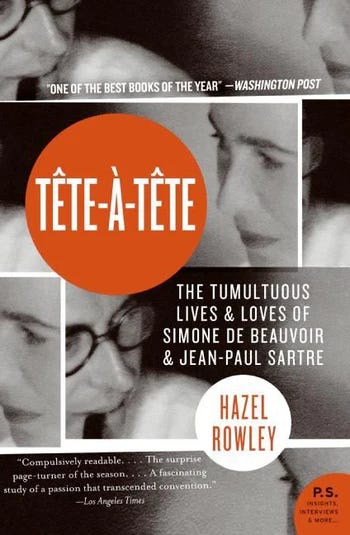
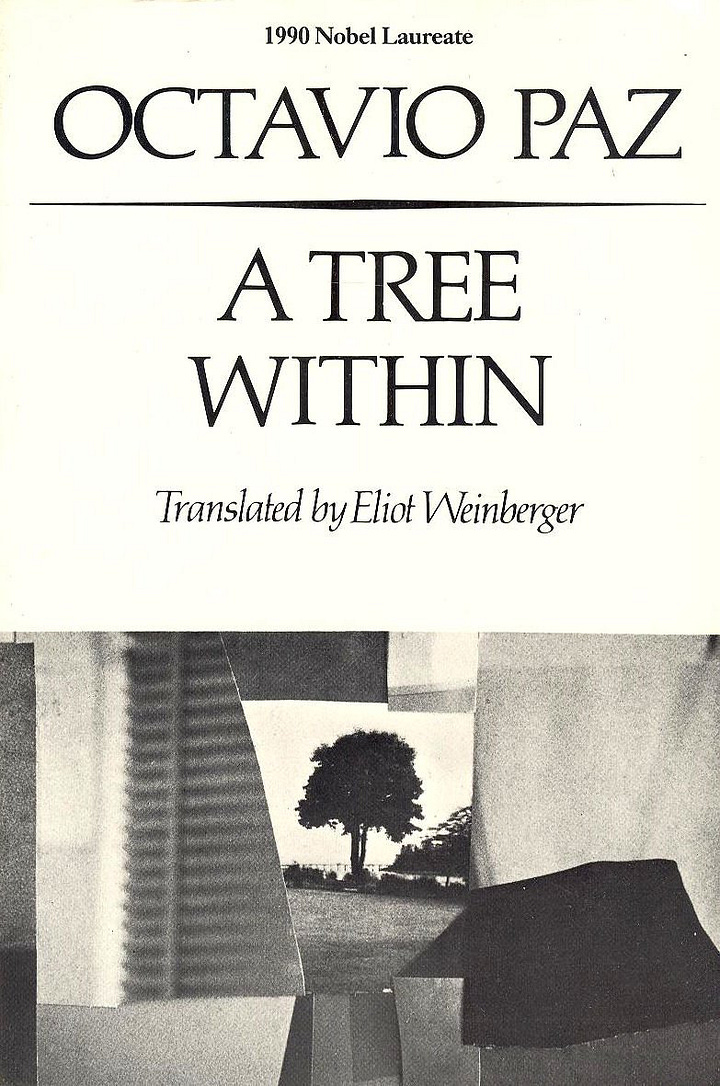
Movies/TV
Lauren Greenfield (Social Studies, Kingmaker, Generation Wealth)
After reading about it in The New York Times, I decided to watch Social Studies (FX on Hulu), a series delving into the lives of LA teens and their social media usage. With the exacting eye of a photographer, Lauren Greenfield masterfully frames each of the teen’s story while sequencing them into a larger collective narrative. It’s a wildly evocative rendering of youth culture that feels deeply relatable (though probably not to viewers who graduated from highschool before 2018. The participants are from the high school class of 2022). I binged the series in 2 ½-hour increments over two days, then dove headfirst into Greenfield’s other documentaries: The Kingmaker and Generation Wealth (I have yet to watch Queen of Versailles, though it’s her most famous work). Her interviews, both subtly satirical and scathingly sentimental, shed light on worlds of edifice and superficiality. She presents a comic yet sobering cast of characters to examine our collective obsession with excess and the performativity of wealth. Through her lens, Greenfield asks: What happens to our personal and communal well-being when consumer capitalism conditions us to chase the promise of more, more, and more?
Children of Men by Alfonso Cuarón
One of Alfonso Cuarón’s overlooked masterworks, Children of Men is a timeless indictment of what happens when fear and misunderstanding become societal benchmarks. Filmed in 2006 but set in 2027, the movie opens with the death of Baby Diego, “the youngest person alive.” Am I watching satire? That’s the first thought provoked by the absurdist public service announcement declaring that the 18-year-old “suffered under the spotlight of being the youngest person in the world.” Quickly, however, we realize the grim reality: a global infertility epidemic has left humanity without a single new birth in over 18 years. The result is a dystopian nightmare. Most of the world has become uninhabitable, while Britain, one of the last surviving nations, enforces brutal policies that treat immigrants like animals. Amid this chaos, classically, hope lies in a seemingly unredemptive white savior, Theo (played by Clive Owen). Though I’m skeptical to suggest a movie with that complex (I’d be unable to recomend most movies before 2016). his portrayal of hope lost but ethics sustained I believe to be a performance we can draw from to help with our present realities. That as well as the sheer ingenuity of as a piece of visual speculative science fiction. The film reminds us that so long as we hold onto our ethics, even in the bleakest of circumstances, hope remains possible.
Conclave by Edward Berger
Appealing to my aesthetically Catholic sensibilities, Conclave is a masterwork of suspense, a prime example of how to cloak (pun intended) key plot elements until the decisive moment. While it certainly portrays religious corruption, posing the question of whether holiness and ambition can coexist, the ending—without giving anything away—reveals a second, far more unexpected layer of symbolism that is quite literally hiding in the shadows.
Emilia Pérez by Jacques Audiard
The Jury Prize winner at Cannes this year, Emilia Pérez is its own genre of movie. While it’s a musical, it’s not about the classical concerns of the genre, at least they are not the primary focus. It’s the story of a Mexican drug cartel leader (Karla Sofia Gascón) who employs a lawyer (Zoe Saldana) to help her transition. Rid of her old gender, she rids herself of her old identity as well, the trauma her actions caused millions of families across Mexico. With Saldana’s help, they start a non-profit to find the bodies of missing people. The plot’s crazy enough—now picture that with inserted musical numbers, ensemble and all. I plan on writing more about it in a longer piece on musicals as a genre (especially with The End coming out in theaters next week, I’m fascinated by what musicals are offering us at this juncture of historical time).
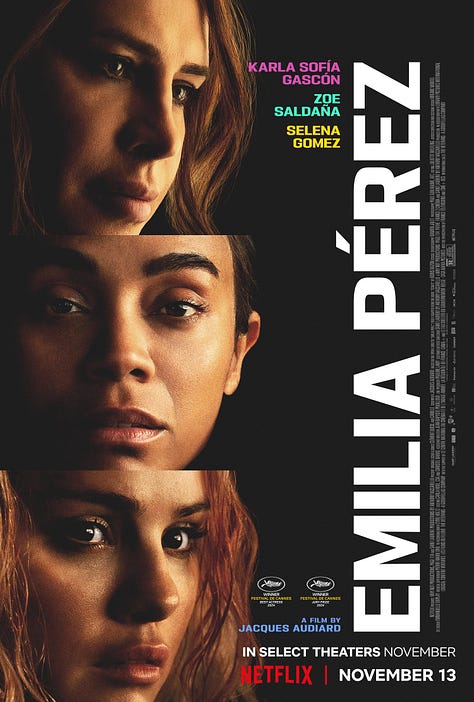
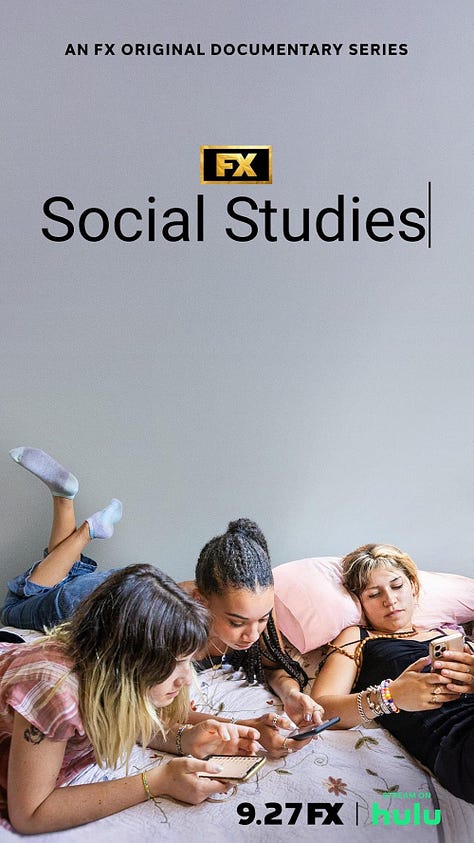
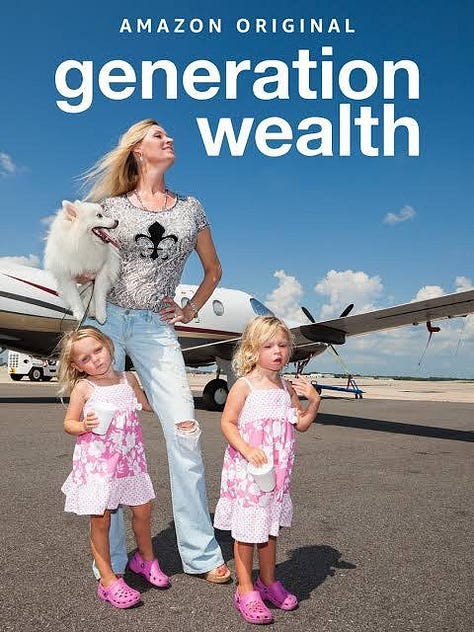
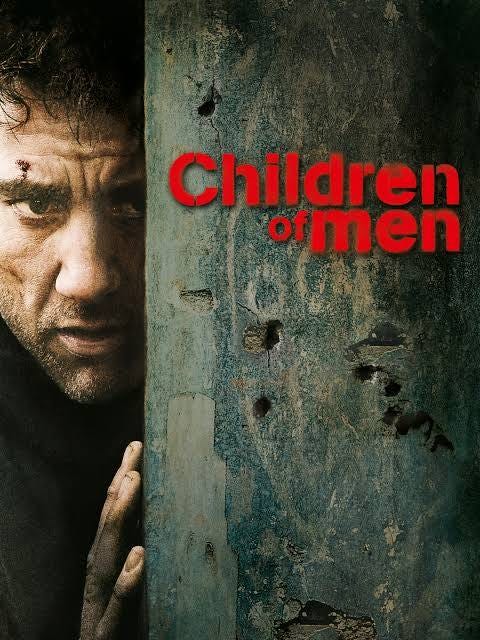
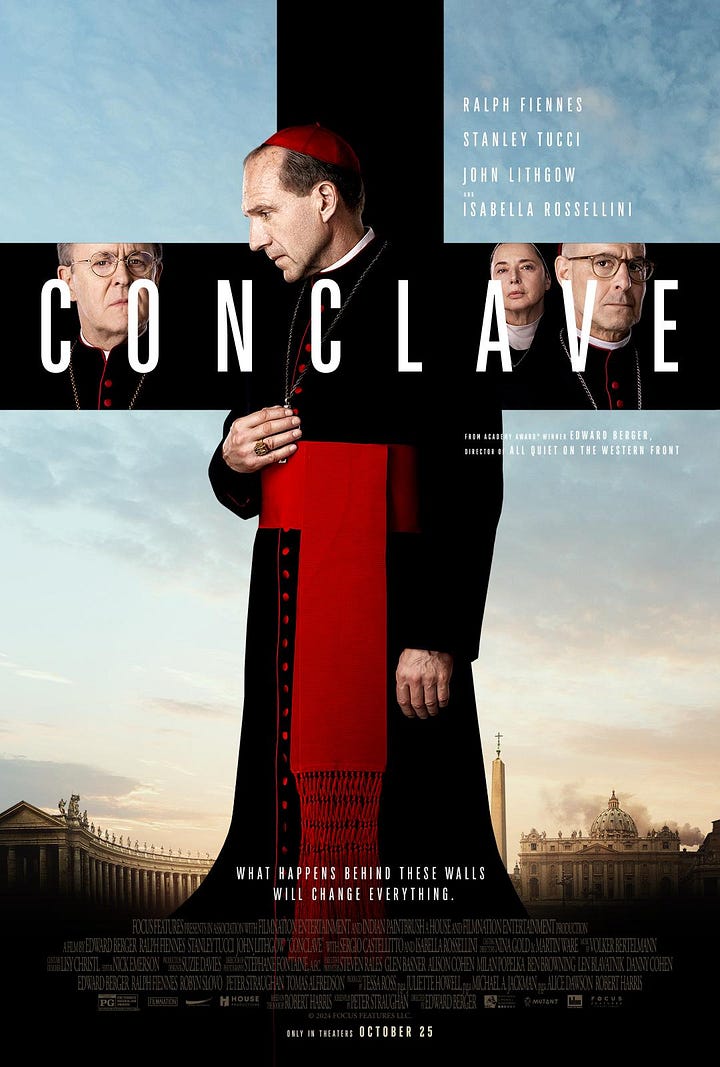
Podcasts
Dialogues (Luc Tymans and Timothy Snyder)
This re-release of the David Zwirner episode is a conversation between painter Luc Tuymans and author Timothy Snyder. Together, they manage to localize the most poignant issues in the post-election landscape (though it was recorded before the results… crazy premonitory...) They discuss the difference between truth and resonance, how freedom is an enterprise of unpredictability, and how the way the governance of the digital world aims to make us predictable and efficient consumers. One of my favorite lines of thought was that polarization is a profoundly uncreative enterprise—it gives us no agency to create a different personal and collective reality.
Exhbitions
Siena: The Rise of the Painting: 1300-1350 (on view through Jan 26, 2025)
Personal bias aside, this temporary exhibit at the MET is well worth a visit. Why, Gemma, should I go out of my way to view some religious iconography from a bygone era? What significance or value can this add to my life at this moment, so rife with contemporary problems? First off, I’d like to propose my theory that, in terms of parallel time periods, we are closer to the Middle Ages now than to other historical junctures. Secondly, I think the way they treated objects and materiality is fascinating and crucial to revitalize today. The meticulous care placed on the treatment of wood, ivory, gold, and textiles is something important to keep in mind as we increasingly treat objects as discardable and destroyable. The fact that these artifacts have been around for seven hundred years and still look like that is genuinely insane to me. Thirdly, I think the flatness of the figures is an interesting visual allegory to our digital traces (this will trickle down into some of my explorations in poems to come).

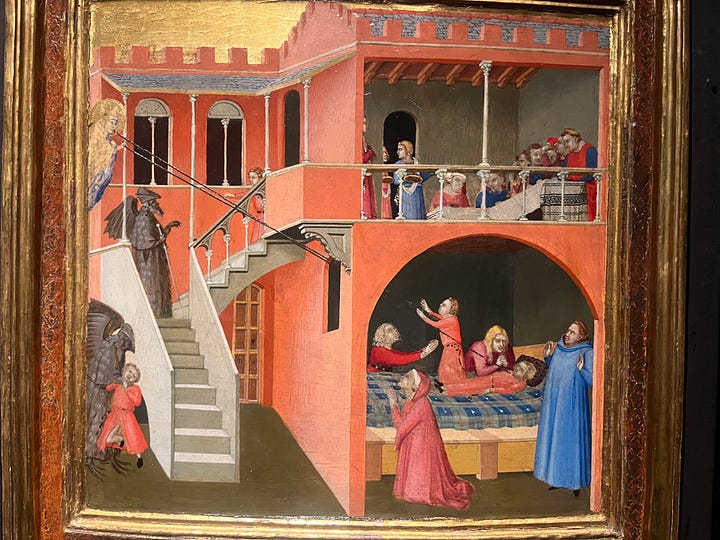
The Crucifixion (Guccio Di Mannaia, 1310), Saint Nicholas Resucitates a Young Boy (Ambrogio Lorenzetti, 1332)
Food
Bjorgcorn
I’m not sure if it’s because the sun has finally tucked away for the winter and I’m newly vitamin D deficient, but I’ve been going through bags of Bjorgcorn like it’s my only job (it is…?). These nutritional yeast-dusted flecks of fairy dust have been a staple this past month, as is expected given the wealth of movies that have come out. November is decisively a popcorn kind of month.
I booked this table two weeks in advance because of its popularity, so I was thrilled that my long wait didn’t end up being in vain. Kisa Sikdang is a “driver restaurant,” known in Korea for a style of laid-back fare traditionally for taxi drivers. There is only one thing on the menu: a tray of various seasonal banchan and your choice of an entrée: bulgogi, spicy pork, bibimbap, or spicy squid. I went with Olivia on a Saturday night at nine-thirty, and we decided to get two trays, a bottle of soju, and some beers (for soju bombs). For the amount of food and beverage, the price-to-payoff ratio is insane and entirely worth the hype. I’m excited to go back for lunch and try their menu (which is different during the day), and go back another night for dinner when I can commit to bringing home my leftovers.
Music
Arnold Schoenberg and Dmitri Shostakovich
Maybe it’s because I’m looking to brood, maybe it’s because I’ve learned that reading books to classical music helps me lock in, but I’ve been consuming a lot more classical music (though I can claim to know absolutely nothing about it). All I know is that I enjoy the way the symphonies flow, helping me, both consciously and subconsciously at times, cycle and process my emotions with the comings and goings of the sonatas, the allegros, and the andantes. I’ve got a soft spot for Shostakovich because I was lucky enough to see his concerto at the Vienna Philharmonic in October which is no doubt the reason for my sustained classical enthusiasm.





